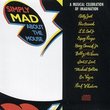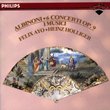| All Artists: Stravinsky, Dutoit, Montréal Symphony Orchestra Title: Petrouchka / Song of the Nightingale Members Wishing: 0 Total Copies: 1 Label: Polygram Records Release Date: 10/25/1990 Genre: Classical Styles: Ballets & Dances, Ballets, Forms & Genres, Theatrical, Incidental & Program Music, Historical Periods, Modern, 20th, & 21st Century Number of Discs: 1 SwapaCD Credits: 1 UPC: 028941761927 |
Search - Stravinsky, Dutoit, Montréal Symphony Orchestra :: Petrouchka / Song of the Nightingale
 | Stravinsky, Dutoit, Montréal Symphony Orchestra Petrouchka / Song of the Nightingale Genre: Classical
Audio CD; London Records catalog #417 619-2; 1987; total playing time is 65:24. CD made in West Germany. Stravinsky's compositions of Petrouchka, Le Chant du Rossignol, and Quarte Etudes, performed by the Orchestre Symphon... more » ![header=[] body=[This CD is available to be requested as disc only.]](/images/attributes/disc.png?v=430e6b0a) ![header=[] body=[This CD is available to be requested with the disc and back insert.]](/images/attributes/disc_back.png?v=430e6b0a) ![header=[] body=[This CD is available to be requested with the disc and front insert.]](/images/attributes/disc_front.png?v=430e6b0a) ![header=[] body=[This CD is available to be requested with the disc, front and back inserts.]](/images/attributes/disc_front_back.png?v=430e6b0a) |
Larger Image |
CD DetailsSynopsis
Product Description Audio CD; London Records catalog #417 619-2; 1987; total playing time is 65:24. CD made in West Germany. Stravinsky's compositions of Petrouchka, Le Chant du Rossignol, and Quarte Etudes, performed by the Orchestre Symphonique de Montreal (Montreal Symphony Orchestra), conducted by Charles Dutoit. Similar CDs
Similarly Requested CDs
|
CD ReviewsAdmirable Performances, an Interesting Program M. C. Passarella | Lawrenceville, GA | 11/16/2005 (5 out of 5 stars) "Well received critically when released almost twenty years ago, this disc has held up well, even if this much-recorded music has received fine recordings since. The "best French orchestra in the world" play Stravinsky's Paris-debuted masterwork with great fervor and feeling; and Dutoit, at the height of his abilities when he made this recording, gives a nuanced performance. Just listen to the "In the Moor's Room" section: he holds back the horns' strange repeated asides just a touch, adding an especially sinister quality to the piece. The "Shrovetide Fair" music sails along, all its multitudinous episodes given individual shape and dimension.
"Song of the Nightingale" is here played in its incarnation as extended tone poem. Again, this is a performance that projects the fantastic program and the Rimskyesque coloration of this dazzling piece. Right on target, too, is the performance of the astringent little orchestral Etudes. They seem to inhabit so different a sound world that you doubt, especially in the final "Madrid," that they're from the same composer's pen. Dutoit and the Montrealers aren't caught off guard, though; they mold themselves perfectly to Stravinsky's new post-Great War style. The Decca engineers always did themselves proud in Montreal, and the recording they provide--wide ranging, beautifully detailed, bright without glare--is among their best. Top-notch all around." |

 Track Listings (11) - Disc #1
Track Listings (11) - Disc #1








![Chapter I: A New Beginning [ENHANCED CD]](https://nationalbookswap.com/cd//m/51/3951/373951.jpg)


